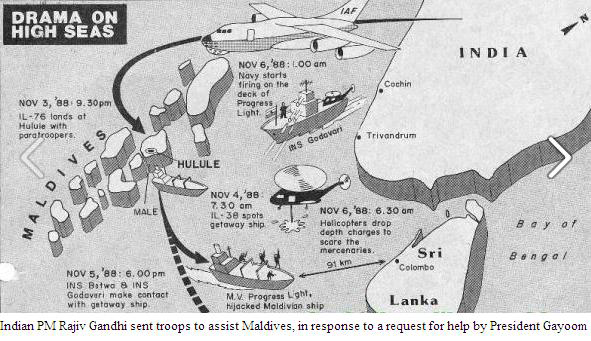February, 2, 2024

By Prof. Samitha Hettige
The British allowed Sri Lanka (SL) to be independent in 1948 but SL depended on; British, Dutch, Portuguese & Indians from time to time prior to that. Unlike Nepal, Bhutan & Bangladesh etc. which depends on India more often in the absence of the British, SL depended on India for conflict prevention/ recovery on few occasions. The Sirima – Sasthri pact (to resolve citizenship issue), Kachchathivu island issue, assistance from IPKF, COVID vaccine supplies & the credit lines to recover from the 2021 economic crisis are notable. Sri Lankan elite depended on Arab Medical professionals during the Kandyan era & Maldives depended on SL before the arrival of Portuguese.
In 1988 Maldives depended on India when SL terrorists invaded its capital Male. India intervened to save Male & the Indian capacity to access into the SL terror groups from their origins may have been a plus factor. Sri Lankans however, had to shift their administrative capital from Anuradhapura to many locations when they didn’t depend on India. Buddhist monks depended on Great China to stabilize SL in the 14th century AD with the present admin capital ‘Sri Jayawardena Pura’ being constructed. Maldives recently indicated they didn’t want to depend on India much & simultaneously experienced chaos in Parliament when appointing the new cabinet few days ago. An election year has dawned in SL & it is vital for SL to manage all factors including sensitive issues such as the Trincomalee Oil tanks to maintain its sovereignty in the Indian Ocean.
Monroe Doctrine
The Monroe Doctrine is one instance SL can study to be independent & work with its Indian Ocean neighbours & China which has increased its global outreach with the Belt & Road Initiative (BRI). Being with the BRI brought FDIs soon after the conflict ended in 2009 & will continue to usher never before opportunities to come out of the economic crisis.
When the USA was the only sovereign state in the Americas in the late 17th century AD, other states were still colonies of the British, Spanish, Portuguese & the Dutch etc. which were also manipulating Asia according to their whims & fancies. The doctrine declared by James Monroe (inspired by John Quincy Adams - one of the greatest diplomats & later president of USA) stated that any country in the Americas which managed to free itself from the European colonizers should not again be brought under it & it was seen as a significant blow to colonialism. The newly established USA was to support those nations to be free & wasn’t to interfere in those countries. The doctrine doesn’t speak of military interventions by the USA & the only instance was in 1865 (after the Civil War) when the British – French military coalition threatened to overthrow democratically elected president Benito Juarez of Mexico. President Abraham Lincoln sent US troops to the Mexican border to indicate that Juarez has friends (Ref US Diplomacy sources). USA practiced a similar approach when Britain & France wanted to attack Egypt during the Suez crisis.
With the expansion of American capital globally (with Dollar diplomacy etc.) things changed. Many analysts believe that President Theodore Roosevelt used the doctrine as his "big stick". He had basically transformed it into a tool making USA as the ‘world policeman’ (as per US interpretations). At present it is being re interpreted by the USA to re colonize the Latin American states that are fast attracting towards rising China reaching them with the BRI. Quincy Adams wanted USA to work with others & not to go out globally looking for ‘monsters to slay’. In the new world order India is working closely with the US on Indo-pacific matters. All those in the Indian Ocean region should be encouraged to think in the lines of Quincy Adams & work for mutual benefit in an inclusive world. (Photo source:www)
(Views expressed are personal)
Video Story